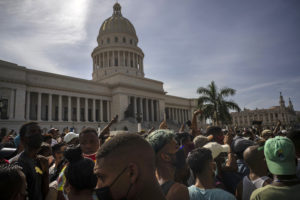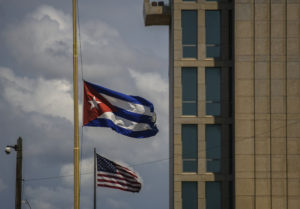By Ana Goerdt
WOLA has written previously about the changing political landscape surrounding U.S.-Cuba relations. Today, the launch of a new 501(c)4 organization, #CubaNow, underscores the degree to which the political debate around Cuba has changed and the abundance of political space that the Obama administration currently has to make further changes to its policy toward Cuba.
According to the conventional wisdom, changing U.S. policy toward Cuba is impossible because of the strength of the Cuban-American exile lobby. For decades, the powerful Cuban American National Foundation (CANF) and other Cuban exile organizations dominated U.S.-Cuba policy. These groups were well-financed and enjoyed both widespread support in Cuban-American communities in Florida and substantial political clout in Washington. At the height of their influence in the 1990s, both Democratic and Republican presidential candidates sought their endorsement, and they pushed for passage of legislation that tightened the embargo. But the influence of traditional Cuban-American exile groups has been waning. Internal battles led the CANF to split in 2001, and in the past ten years, voices within the Cuban-American community have begun to question the logic of the embargo and isolation in general. While the isolationist Cuban-American community continues to be represented in Washington, its heyday is over.
In recent years, the diversification of the debate in Florida has accelerated. New waves of Cuban immigrants express more interest in maintaining contact with family on the island and are less likely to support sanctions. In February 2014, a poll commissioned by the nonpartisan Atlantic Council found that 63 percent of Floridians favor greater engagement with Cuba. A recent conference in Miami sponsored by the barely two-year-old organization Cuban Americans for Engagement (CAFE) attracted dozens of attendees, who came to discuss how to advance the normalization agenda in Miami. And even prominent members of the original exile generation —such as Cuban-American businessmen Carlos Saladrigas, Alfonso “Alfy” Fanjul, and Jorge Pérez—have expressed interest in engaging more with the island.
It’s within this context that #CubaNow has emerged. The organization, which is made up of mostly Cuban Americans, represents the evolution of large swathes of the Cuban-American community when it comes to dealing with Cuba. “If we want to be relevant in the Cuban people’s new reality and help influence the changes that are already happening, our 50 year-old isolationist policy simply isn’t an option anymore,” #CubaNow declares on its website.
Of course, supporters of the embargo claim that changes in the Cuban-American community are grossly exaggerated. In a recent interview with the New York Times, Florida Representative Mario Diaz-Balart, who is known for his strident pro-embargo stance, denied that there have been any changes in the views of the Cuban-American community. He even went so far as to deny that the majority of Americans support a change in U.S.-Cuba policy, calling the assertion “an absolute lie.”
The inconvenient truth for pro-embargo advocates is that the numbers don’t lie. The 2014 Atlantic Council poll found that 56 percent of Americans support engaging more with Cuba; this number corroborates the findings of various other polls throughout the years. Even in Florida, Cuba has ceased to be a third-rail political issue: moderate Cuban Americans have won election to the state legislature and to the U.S. Congress, and gubernatorial candidate Charlie Crist has called for an end to the embargo. President Obama won Florida in both the 2008 and 2012 elections (and it’s worth pointing out that after relaxing restrictions on remittances and travel in 2009 and 2011, he increased his share of the Cuban-American vote by ten points in 2012).
At the end of the day, all of these developments point to a growing momentum toward changing U.S.-Cuba policy, which gives the Obama administration ample political space to build on its 2009 and 2011 reforms. The administration has broad authority to interpret the embargo and travel restrictions, and suggestions of how to do so abound (for example, see recent memos to the President on this topic by both the Brookings Institution and the Council of the Americas). The writing is on the wall; it’s time for the administration to act.
Ana Goerdt is WOLA’s Program Officer for Cuba.


